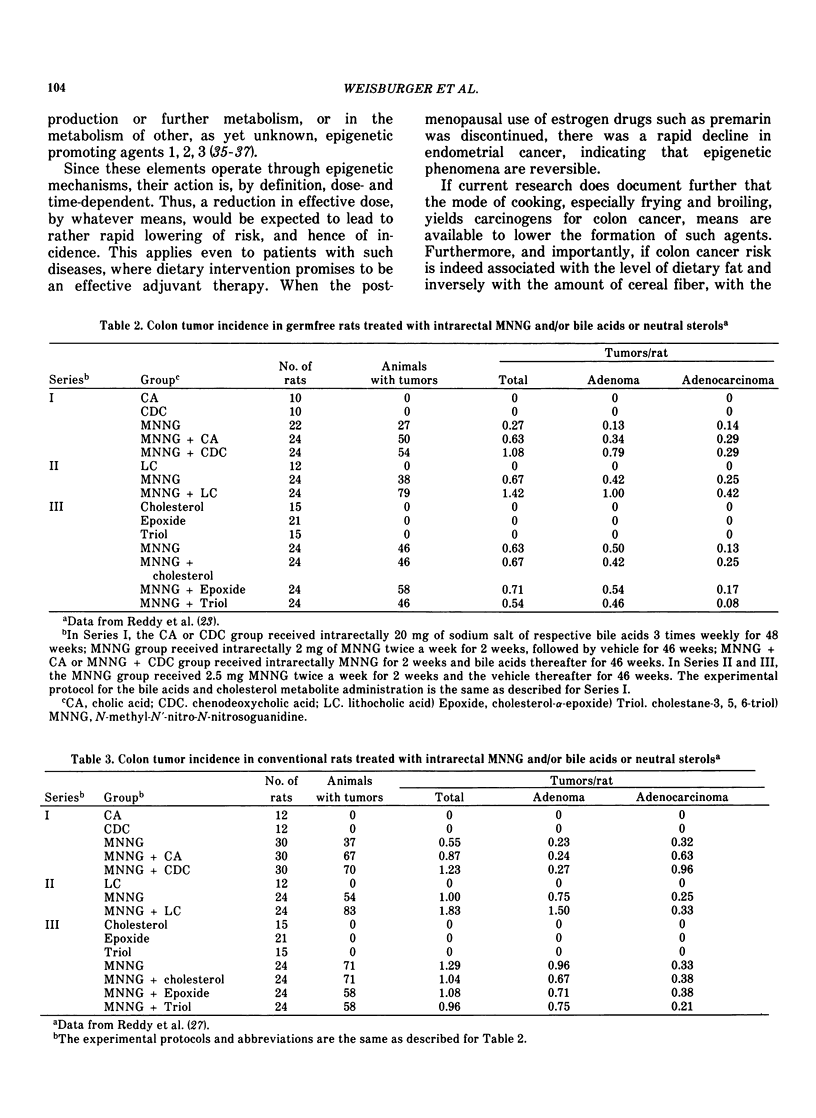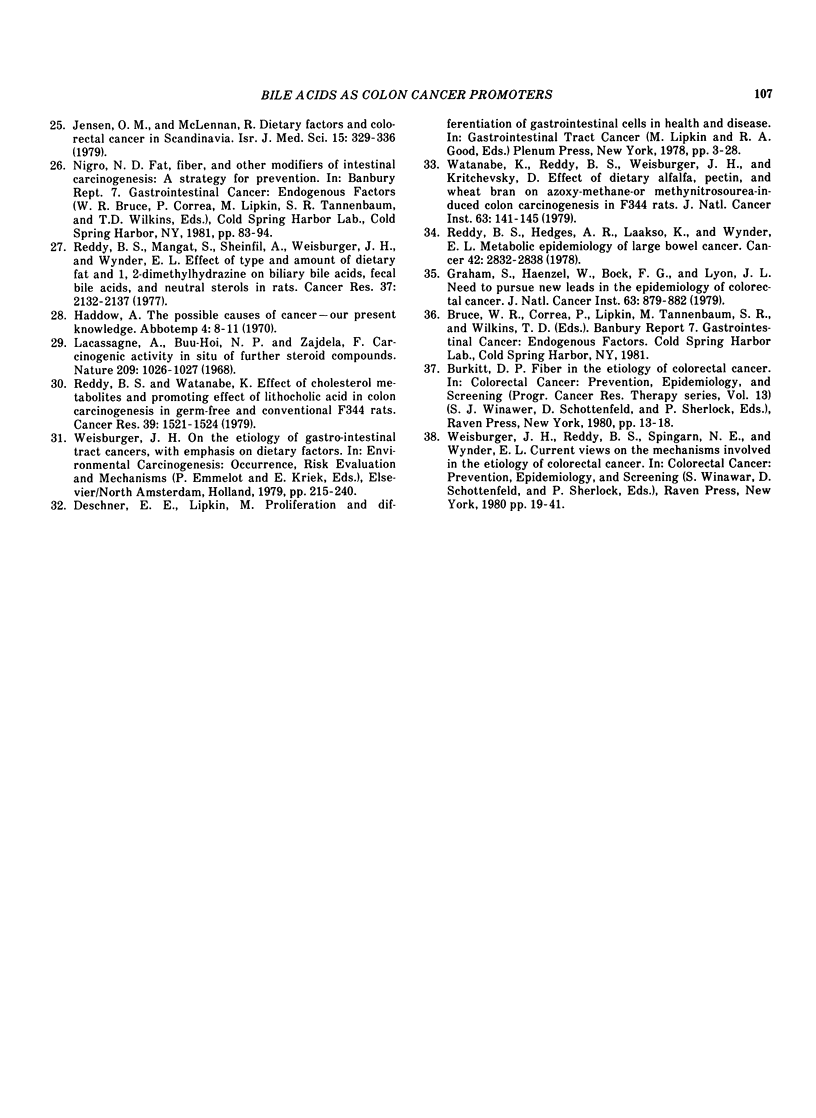Abstract
Analysis of the etiologic factors and relevant mechanisms involved in carcinogenesis leads to a classification of agents involved in the carcinogenic process as genotoxic or epigenetic. Their mode of action is distinct, especially with regard to dose-response effects and reversibility. The genotoxic carcinogens for colon cancer are unknown, but mutagenic components found in fried beef and fish are under study. Epigenetic agents as promoting factors play a major role in the development of cancer of the colon. Specific nutritional elements associated with colon cancer risk are high fat diets, high cholesterol intake, and low fiber intake. The role of micronutrients as modulators and inhibitors needs to be explored. Through metabolic studies in diverse populations and in reliable animal models, it is now clear that dietary fat and cholesterol control the total flow of bile acids in lumen and a high-fat, high-cholesterol diet increases the total of bile acids in the gut. Bile acids but not neutral sterols have promoting effects and are related to colon cancer risk although bile acids by themselves do not act as complete carcinogens. The effect of dietary fiber such as cereal bran is to increase stool bulk which dilutes the concentration of bile acids. Reducing the concentration of bile acids either by lower dietary fat and cholesterol or by increasing dietary fiber may effectively lower the risk for colon cancer.
Full text
PDF






Selected References
These references are in PubMed. This may not be the complete list of references from this article.
- Doll R., Peto R. The causes of cancer: quantitative estimates of avoidable risks of cancer in the United States today. J Natl Cancer Inst. 1981 Jun;66(6):1191–1308. [PubMed] [Google Scholar]
- Graham S., Haenszel W., Bock F. G., Lyon J. L. Need to pursue new leads in the epidemiology of colorectal cancer. J Natl Cancer Inst. 1979 Oct;63(4):879–881. [PubMed] [Google Scholar]
- Higginson J. Proportion of cancers due to occupation. Prev Med. 1980 Mar;9(2):180–188. doi: 10.1016/0091-7435(80)90073-0. [DOI] [PubMed] [Google Scholar]
- Jensen O. M., Maclennan R. Dietary factors and colorectal cancer in Scandinavia. Isr J Med Sci. 1979 Apr;15(4):329–334. [PubMed] [Google Scholar]
- Lacassagne A., Buu-Hoï N. P., Zajdela F. Carcinogenic activity in situ of further steroid compounds. Nature. 1966 Mar 5;209(5027):1026–1027. doi: 10.1038/2091026b0. [DOI] [PubMed] [Google Scholar]
- Miller A. B. Risk factors from geographic epidemiology for gastrointestinal cancer. Cancer. 1982 Dec 1;50(11 Suppl):2533–2540. [PubMed] [Google Scholar]
- Modan B., Barell V., Lubin F., Modan M., Greenberg R. A., Graham S. Low-fiber intake as an etiologic factor in cancer of the colon. J Natl Cancer Inst. 1975 Jul;55(1):15–18. doi: 10.1093/jnci/55.1.15. [DOI] [PubMed] [Google Scholar]
- Pitot H. C., Sirica A. E. The stages of initiation and promotion in hepatocarcinogenesis. Biochim Biophys Acta. 1980 May 6;605(2):191–215. doi: 10.1016/0304-419x(80)90004-9. [DOI] [PubMed] [Google Scholar]
- Reddy B. S., Cohen L. A., McCoy G. D., Hill P., Weisburger J. H., Wynder E. L. Nutrition and its relationship to cancer. Adv Cancer Res. 1980;32:237–345. doi: 10.1016/s0065-230x(08)60363-2. [DOI] [PubMed] [Google Scholar]
- Reddy B. S., Hedges A. R., Laakso K., Wynder E. L. Metabolic epidemiology of large bowel cancer: fecal bulk and constituents of high-risk North American and low-risk Finnish population. Cancer. 1978 Dec;42(6):2832–2838. doi: 10.1002/1097-0142(197812)42:6<2832::aid-cncr2820420644>3.0.co;2-l. [DOI] [PubMed] [Google Scholar]
- Reddy B. S., Mangat S., Sheinfil A., Weisburger J. H., Wynder E. L. Effect of type and amount of dietary fat and 1,2-dimethylhydrazine on biliary bile acids, fecal bile acids, and neutral sterols in rats. Cancer Res. 1977 Jul;37(7 Pt 1):2132–2137. [PubMed] [Google Scholar]
- Reddy B. S., Watanabe K. Effect of cholesterol metabolites and promoting effect of lithocholic acid in colon carcinogenesis in germ-free and conventional F344 rats. Cancer Res. 1979 May;39(5):1521–1524. [PubMed] [Google Scholar]
- Shibamoto T., Nishimura O., Mihara S. Mutagenicity of products obtained from a maltol-ammonia browning model system. J Agric Food Chem. 1981 May-Jun;29(3):643–646. doi: 10.1021/jf00105a052. [DOI] [PubMed] [Google Scholar]
- Spingarn N. E., Garvie C. T. Formation of mutagens in sugar-ammonia model systems. J Agric Food Chem. 1979 Nov-Dec;27(6):1319–1321. doi: 10.1021/jf60226a023. [DOI] [PubMed] [Google Scholar]
- Straus D. S. Somatic mutation, cellular differentiation, and cancer causation. J Natl Cancer Inst. 1981 Aug;67(2):233–241. [PubMed] [Google Scholar]
- Watanabe K., Reddy B. S., Weisburger J. H., Kritchevsky D. Effect of dietary alfalfa, pectin, and wheat bran on azoxymethane-or methylnitrosourea-induced colon carcinogenesis in F344 rats. J Natl Cancer Inst. 1979 Jul;63(1):141–145. [PubMed] [Google Scholar]
- Weisburger J. H., Williams G. M. The distinct health risk analyses required for genotoxic carcinogens and promoting agents. Environ Health Perspect. 1983 Apr;50:233–245. doi: 10.1289/ehp.8350233. [DOI] [PMC free article] [PubMed] [Google Scholar]
- Wynder E. L., Gori G. B. Contribution of the environment to cancer incidence: an epidemiologic exercise. J Natl Cancer Inst. 1977 Apr;58(4):825–832. doi: 10.1093/jnci/58.4.825. [DOI] [PubMed] [Google Scholar]
- Wynder E. L., Hoffmann D. Tobacco and health: a societal challenge. N Engl J Med. 1979 Apr 19;300(16):894–903. doi: 10.1056/NEJM197904193001605. [DOI] [PubMed] [Google Scholar]


